Analysis: Korea's Beef Import Measures under WTO Law (DS161 & DS169)
VerifiedAdded on 2023/06/15
|13
|1956
|158
Case Study
AI Summary
This case study examines the World Trade Organization (WTO) dispute between the United States and Korea regarding Korea's measures on imported beef. The United States alleged that Korea discriminated against imported beef by prioritizing domestic beef, limiting sales to specific shops, restricting display styles, and imposing high selling prices. The US argued that these measures violated several articles of GATT 1994, the Agreement on Agriculture (AOA), and the Import Licensing Agreement. The WTO panel found that many of Korea's measures were inconsistent with its obligations under GATT. While Korea initially appealed, it eventually adopted the Dispute Settlement Board's (DSB) guidelines, implementing necessary amendments to ensure fair market access for imported US beef. This case highlights the complexities of international trade law and the WTO's role in resolving trade disputes.
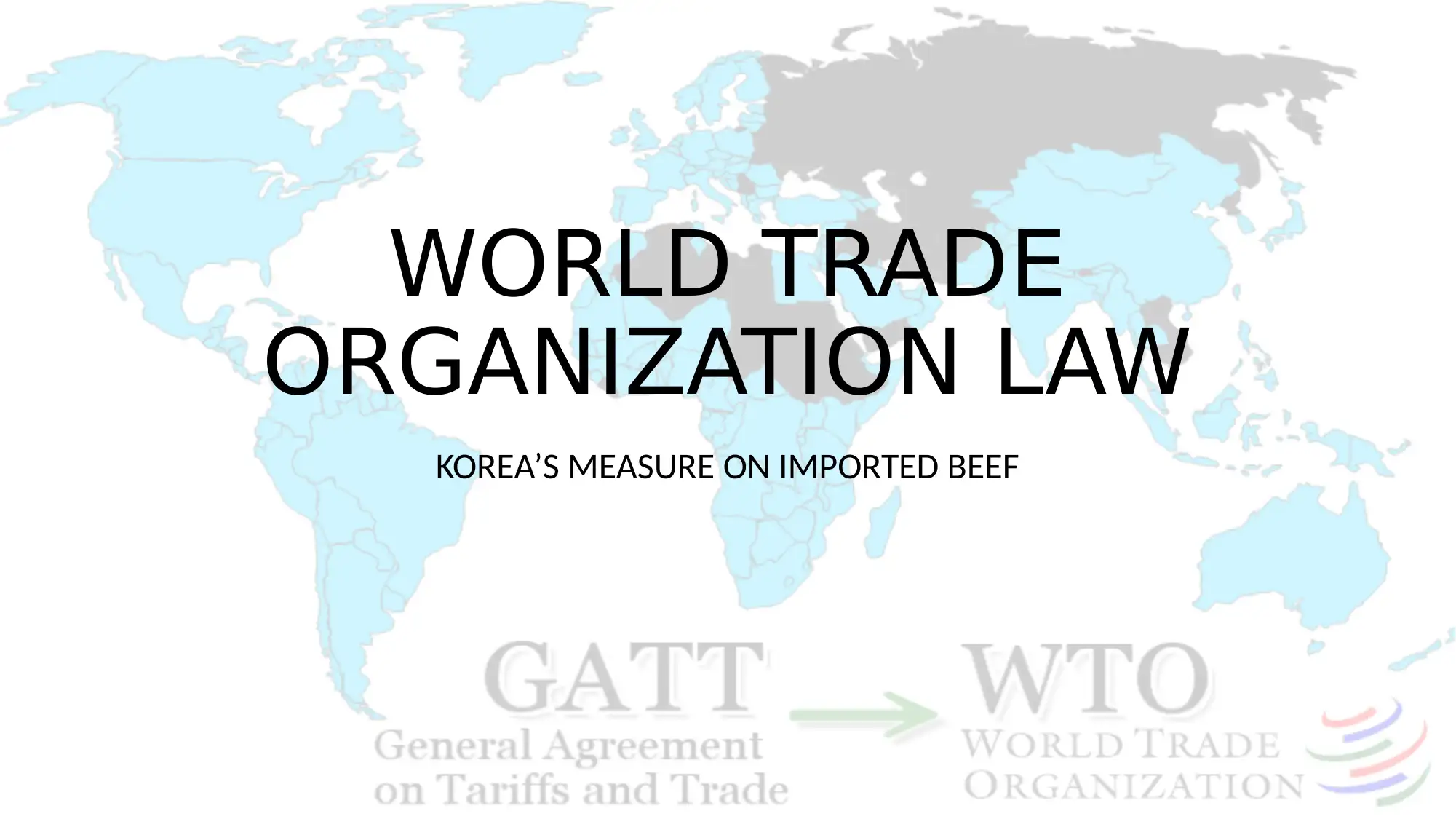
WORLD TRADE
ORGANIZATION LAW
KOREA’S MEASURE ON IMPORTED BEEF
ORGANIZATION LAW
KOREA’S MEASURE ON IMPORTED BEEF
Paraphrase This Document
Need a fresh take? Get an instant paraphrase of this document with our AI Paraphraser
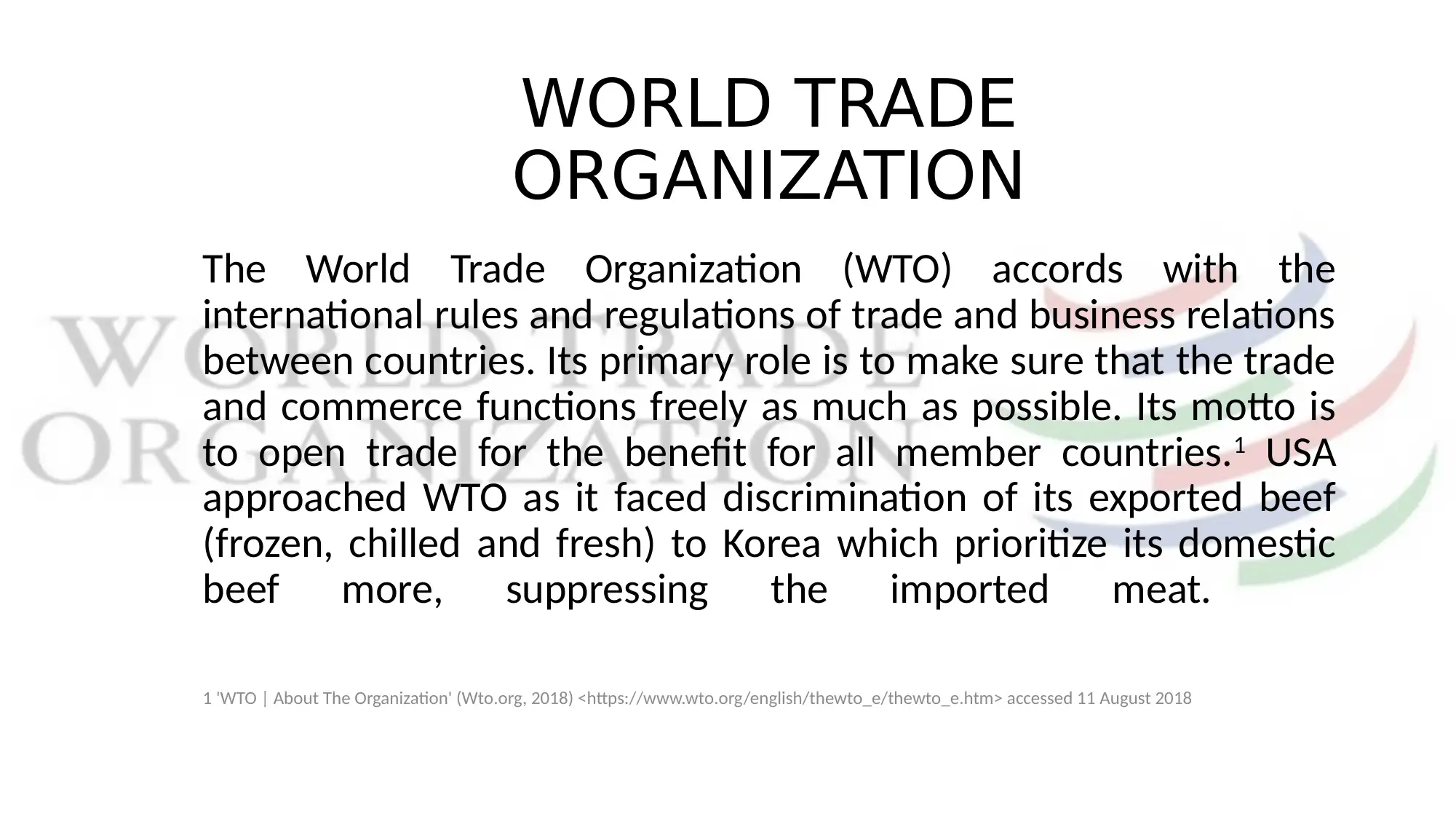
WORLD TRADE
ORGANIZATION
The World Trade Organization (WTO) accords with the
international rules and regulations of trade and business relations
between countries. Its primary role is to make sure that the trade
and commerce functions freely as much as possible. Its motto is
to open trade for the benefit for all member countries.1 USA
approached WTO as it faced discrimination of its exported beef
(frozen, chilled and fresh) to Korea which prioritize its domestic
beef more, suppressing the imported meat.
1 'WTO | About The Organization' (Wto.org, 2018) <https://www.wto.org/english/thewto_e/thewto_e.htm> accessed 11 August 2018
ORGANIZATION
The World Trade Organization (WTO) accords with the
international rules and regulations of trade and business relations
between countries. Its primary role is to make sure that the trade
and commerce functions freely as much as possible. Its motto is
to open trade for the benefit for all member countries.1 USA
approached WTO as it faced discrimination of its exported beef
(frozen, chilled and fresh) to Korea which prioritize its domestic
beef more, suppressing the imported meat.
1 'WTO | About The Organization' (Wto.org, 2018) <https://www.wto.org/english/thewto_e/thewto_e.htm> accessed 11 August 2018
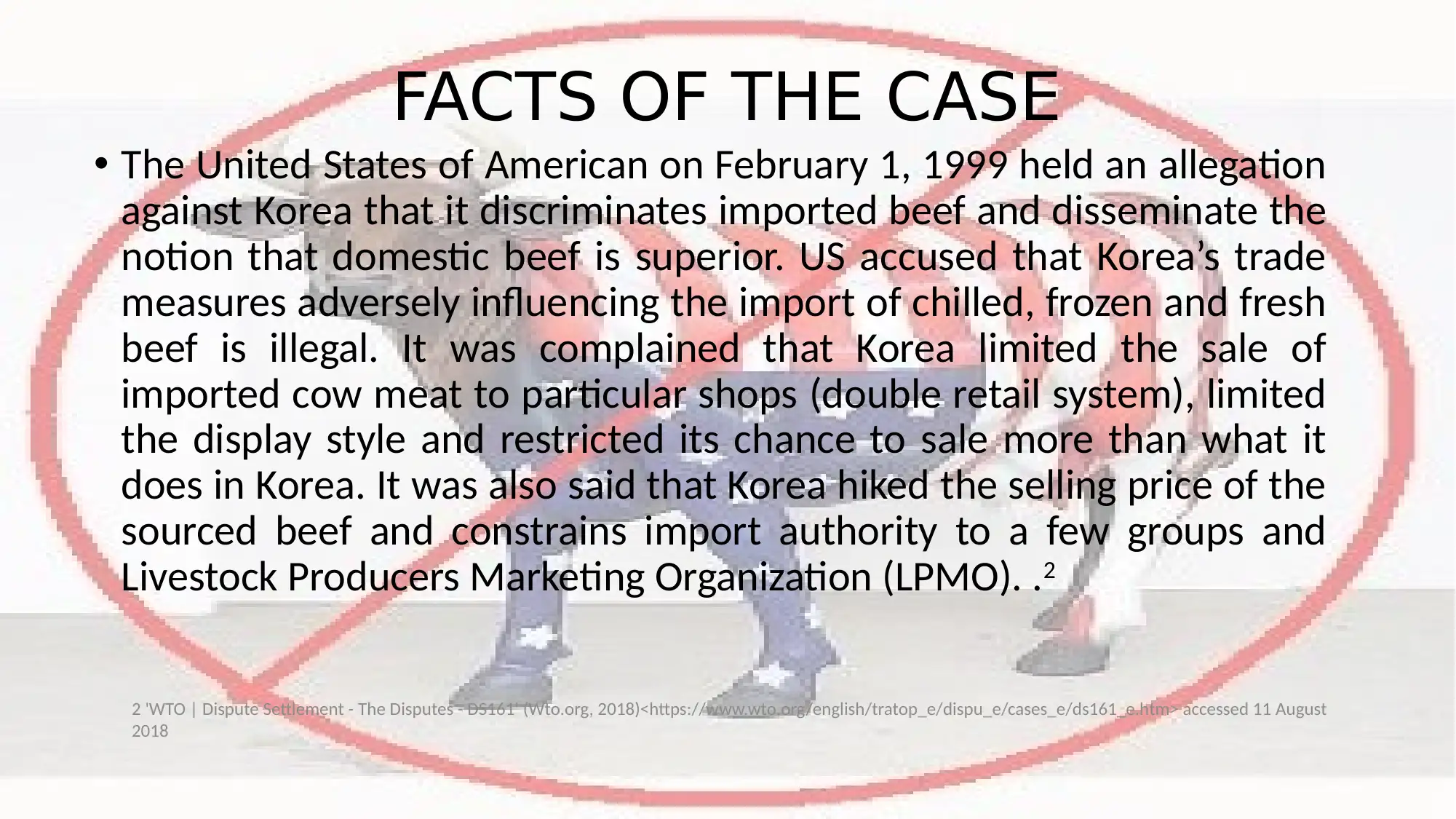
FACTS OF THE CASE
• The United States of American on February 1, 1999 held an allegation
against Korea that it discriminates imported beef and disseminate the
notion that domestic beef is superior. US accused that Korea’s trade
measures adversely influencing the import of chilled, frozen and fresh
beef is illegal. It was complained that Korea limited the sale of
imported cow meat to particular shops (double retail system), limited
the display style and restricted its chance to sale more than what it
does in Korea. It was also said that Korea hiked the selling price of the
sourced beef and constrains import authority to a few groups and
Livestock Producers Marketing Organization (LPMO). .2
2 'WTO | Dispute Settlement - The Disputes - DS161' (Wto.org, 2018)<https://www.wto.org/english/tratop_e/dispu_e/cases_e/ds161_e.htm> accessed 11 August
2018
• The United States of American on February 1, 1999 held an allegation
against Korea that it discriminates imported beef and disseminate the
notion that domestic beef is superior. US accused that Korea’s trade
measures adversely influencing the import of chilled, frozen and fresh
beef is illegal. It was complained that Korea limited the sale of
imported cow meat to particular shops (double retail system), limited
the display style and restricted its chance to sale more than what it
does in Korea. It was also said that Korea hiked the selling price of the
sourced beef and constrains import authority to a few groups and
Livestock Producers Marketing Organization (LPMO). .2
2 'WTO | Dispute Settlement - The Disputes - DS161' (Wto.org, 2018)<https://www.wto.org/english/tratop_e/dispu_e/cases_e/ds161_e.htm> accessed 11 August
2018
⊘ This is a preview!⊘
Do you want full access?
Subscribe today to unlock all pages.

Trusted by 1+ million students worldwide
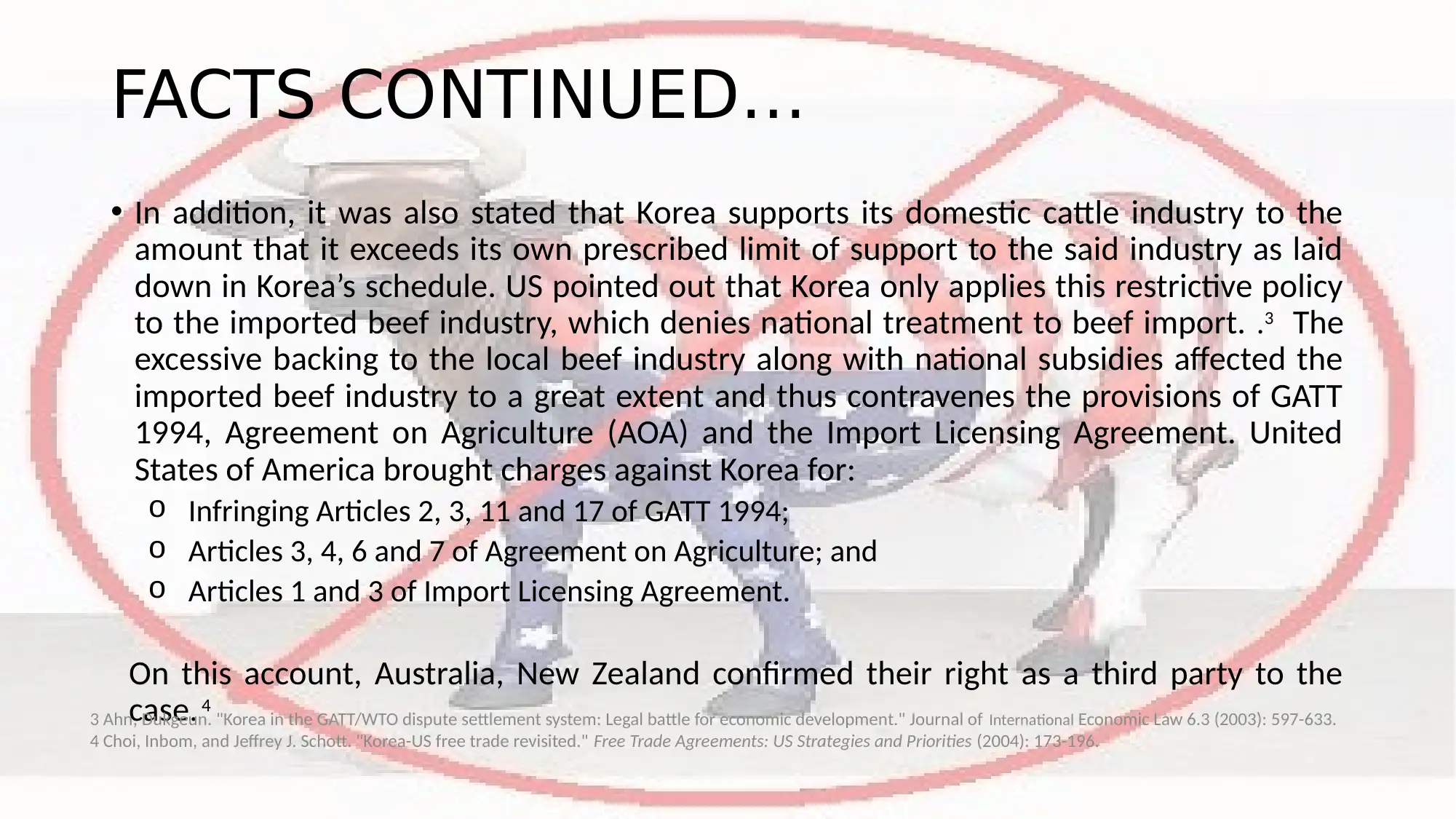
FACTS CONTINUED…
• In addition, it was also stated that Korea supports its domestic cattle industry to the
amount that it exceeds its own prescribed limit of support to the said industry as laid
down in Korea’s schedule. US pointed out that Korea only applies this restrictive policy
to the imported beef industry, which denies national treatment to beef import. .3 The
excessive backing to the local beef industry along with national subsidies affected the
imported beef industry to a great extent and thus contravenes the provisions of GATT
1994, Agreement on Agriculture (AOA) and the Import Licensing Agreement. United
States of America brought charges against Korea for:
o Infringing Articles 2, 3, 11 and 17 of GATT 1994;
o Articles 3, 4, 6 and 7 of Agreement on Agriculture; and
o Articles 1 and 3 of Import Licensing Agreement.
On this account, Australia, New Zealand confirmed their right as a third party to the
case. 4
3 Ahn, Dukgeun. "Korea in the GATT/WTO dispute settlement system: Legal battle for economic development." Journal of International Economic Law 6.3 (2003): 597-633.
4 Choi, Inbom, and Jeffrey J. Schott. "Korea-US free trade revisited." Free Trade Agreements: US Strategies and Priorities (2004): 173-196.
• In addition, it was also stated that Korea supports its domestic cattle industry to the
amount that it exceeds its own prescribed limit of support to the said industry as laid
down in Korea’s schedule. US pointed out that Korea only applies this restrictive policy
to the imported beef industry, which denies national treatment to beef import. .3 The
excessive backing to the local beef industry along with national subsidies affected the
imported beef industry to a great extent and thus contravenes the provisions of GATT
1994, Agreement on Agriculture (AOA) and the Import Licensing Agreement. United
States of America brought charges against Korea for:
o Infringing Articles 2, 3, 11 and 17 of GATT 1994;
o Articles 3, 4, 6 and 7 of Agreement on Agriculture; and
o Articles 1 and 3 of Import Licensing Agreement.
On this account, Australia, New Zealand confirmed their right as a third party to the
case. 4
3 Ahn, Dukgeun. "Korea in the GATT/WTO dispute settlement system: Legal battle for economic development." Journal of International Economic Law 6.3 (2003): 597-633.
4 Choi, Inbom, and Jeffrey J. Schott. "Korea-US free trade revisited." Free Trade Agreements: US Strategies and Priorities (2004): 173-196.
Paraphrase This Document
Need a fresh take? Get an instant paraphrase of this document with our AI Paraphraser
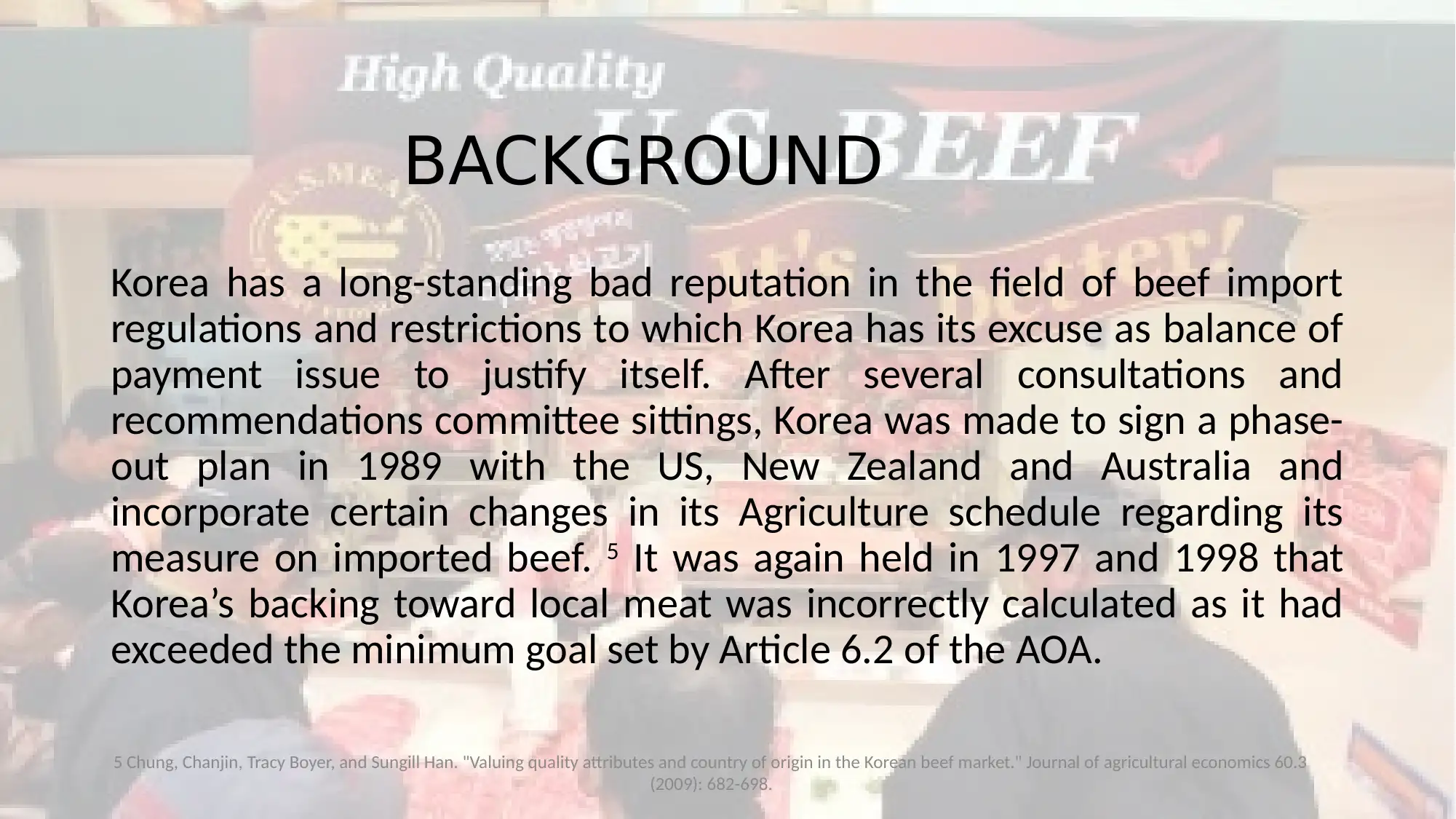
BACKGROUND
Korea has a long-standing bad reputation in the field of beef import
regulations and restrictions to which Korea has its excuse as balance of
payment issue to justify itself. After several consultations and
recommendations committee sittings, Korea was made to sign a phase-
out plan in 1989 with the US, New Zealand and Australia and
incorporate certain changes in its Agriculture schedule regarding its
measure on imported beef. 5 It was again held in 1997 and 1998 that
Korea’s backing toward local meat was incorrectly calculated as it had
exceeded the minimum goal set by Article 6.2 of the AOA.
5 Chung, Chanjin, Tracy Boyer, and Sungill Han. "Valuing quality attributes and country of origin in the Korean beef market." Journal of agricultural economics 60.3
(2009): 682-698.
Korea has a long-standing bad reputation in the field of beef import
regulations and restrictions to which Korea has its excuse as balance of
payment issue to justify itself. After several consultations and
recommendations committee sittings, Korea was made to sign a phase-
out plan in 1989 with the US, New Zealand and Australia and
incorporate certain changes in its Agriculture schedule regarding its
measure on imported beef. 5 It was again held in 1997 and 1998 that
Korea’s backing toward local meat was incorrectly calculated as it had
exceeded the minimum goal set by Article 6.2 of the AOA.
5 Chung, Chanjin, Tracy Boyer, and Sungill Han. "Valuing quality attributes and country of origin in the Korean beef market." Journal of agricultural economics 60.3
(2009): 682-698.
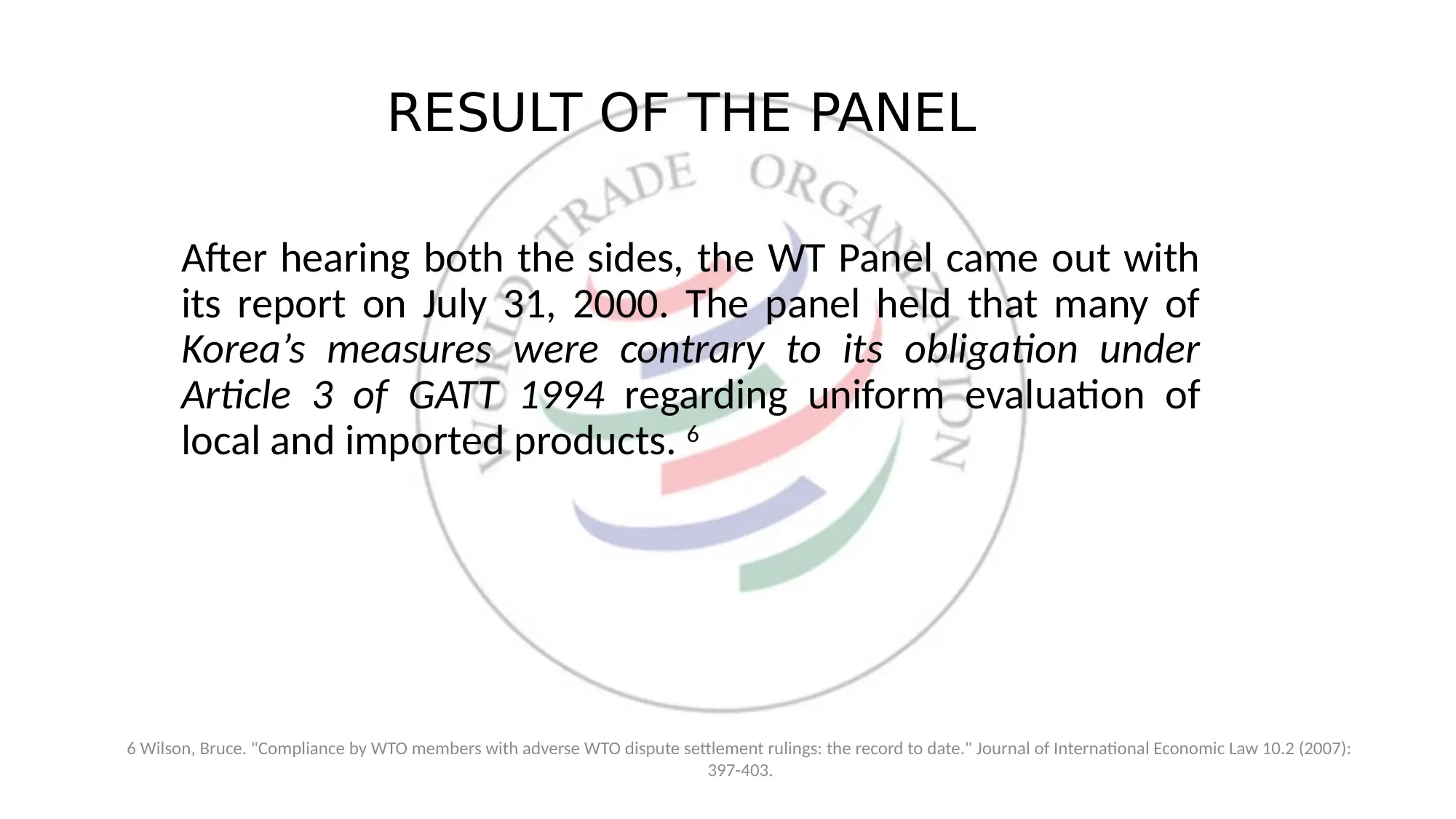
RESULT OF THE PANEL
After hearing both the sides, the WT Panel came out with
its report on July 31, 2000. The panel held that many of
Korea’s measures were contrary to its obligation under
Article 3 of GATT 1994 regarding uniform evaluation of
local and imported products. 6
6 Wilson, Bruce. "Compliance by WTO members with adverse WTO dispute settlement rulings: the record to date." Journal of International Economic Law 10.2 (2007):
397-403.
After hearing both the sides, the WT Panel came out with
its report on July 31, 2000. The panel held that many of
Korea’s measures were contrary to its obligation under
Article 3 of GATT 1994 regarding uniform evaluation of
local and imported products. 6
6 Wilson, Bruce. "Compliance by WTO members with adverse WTO dispute settlement rulings: the record to date." Journal of International Economic Law 10.2 (2007):
397-403.
⊘ This is a preview!⊘
Do you want full access?
Subscribe today to unlock all pages.

Trusted by 1+ million students worldwide
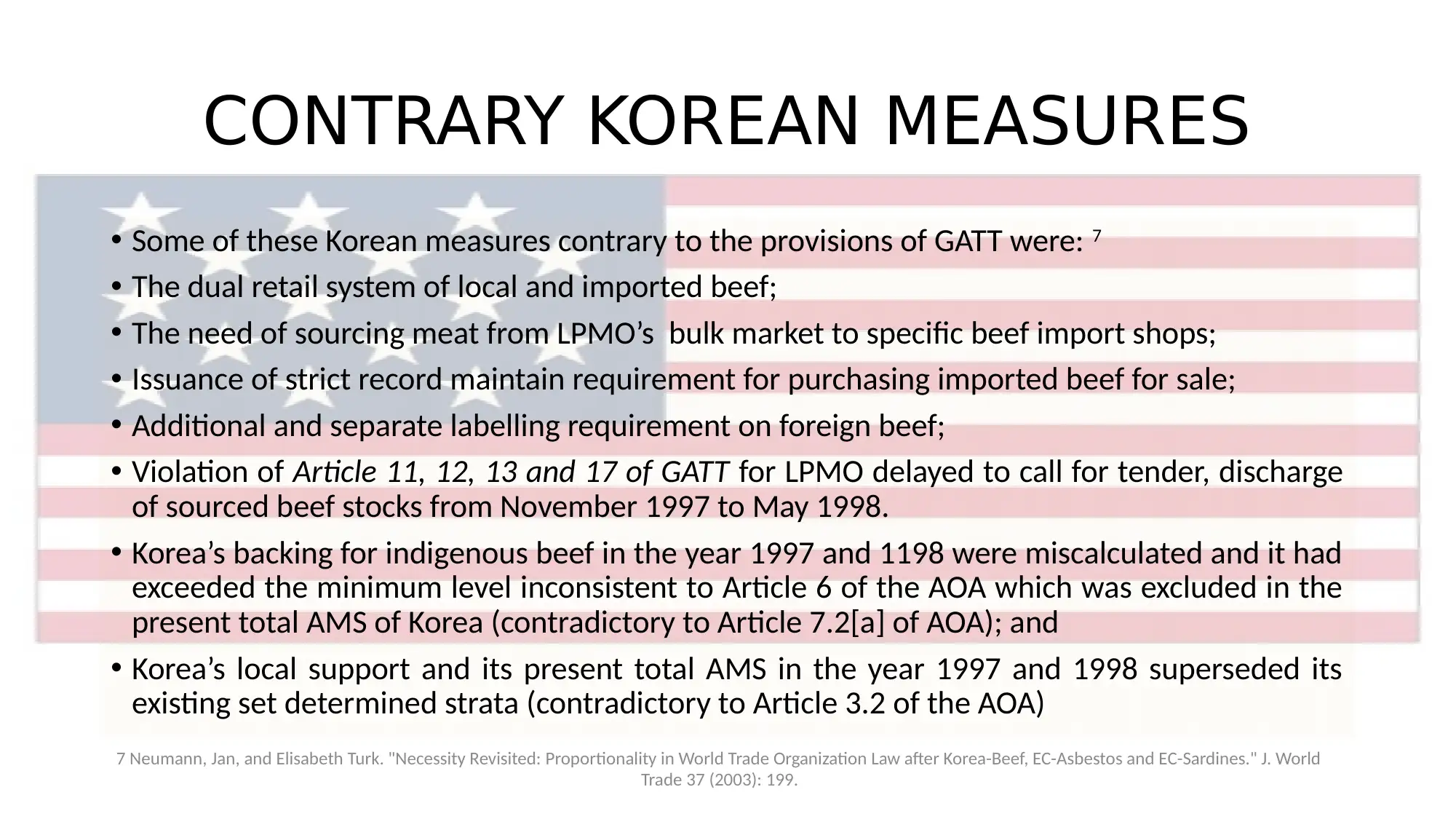
CONTRARY KOREAN MEASURES
• Some of these Korean measures contrary to the provisions of GATT were: 7
• The dual retail system of local and imported beef;
• The need of sourcing meat from LPMO’s bulk market to specific beef import shops;
• Issuance of strict record maintain requirement for purchasing imported beef for sale;
• Additional and separate labelling requirement on foreign beef;
• Violation of Article 11, 12, 13 and 17 of GATT for LPMO delayed to call for tender, discharge
of sourced beef stocks from November 1997 to May 1998.
• Korea’s backing for indigenous beef in the year 1997 and 1198 were miscalculated and it had
exceeded the minimum level inconsistent to Article 6 of the AOA which was excluded in the
present total AMS of Korea (contradictory to Article 7.2[a] of AOA); and
• Korea’s local support and its present total AMS in the year 1997 and 1998 superseded its
existing set determined strata (contradictory to Article 3.2 of the AOA)
7 Neumann, Jan, and Elisabeth Turk. "Necessity Revisited: Proportionality in World Trade Organization Law after Korea-Beef, EC-Asbestos and EC-Sardines." J. World
Trade 37 (2003): 199.
• Some of these Korean measures contrary to the provisions of GATT were: 7
• The dual retail system of local and imported beef;
• The need of sourcing meat from LPMO’s bulk market to specific beef import shops;
• Issuance of strict record maintain requirement for purchasing imported beef for sale;
• Additional and separate labelling requirement on foreign beef;
• Violation of Article 11, 12, 13 and 17 of GATT for LPMO delayed to call for tender, discharge
of sourced beef stocks from November 1997 to May 1998.
• Korea’s backing for indigenous beef in the year 1997 and 1198 were miscalculated and it had
exceeded the minimum level inconsistent to Article 6 of the AOA which was excluded in the
present total AMS of Korea (contradictory to Article 7.2[a] of AOA); and
• Korea’s local support and its present total AMS in the year 1997 and 1998 superseded its
existing set determined strata (contradictory to Article 3.2 of the AOA)
7 Neumann, Jan, and Elisabeth Turk. "Necessity Revisited: Proportionality in World Trade Organization Law after Korea-Beef, EC-Asbestos and EC-Sardines." J. World
Trade 37 (2003): 199.
Paraphrase This Document
Need a fresh take? Get an instant paraphrase of this document with our AI Paraphraser
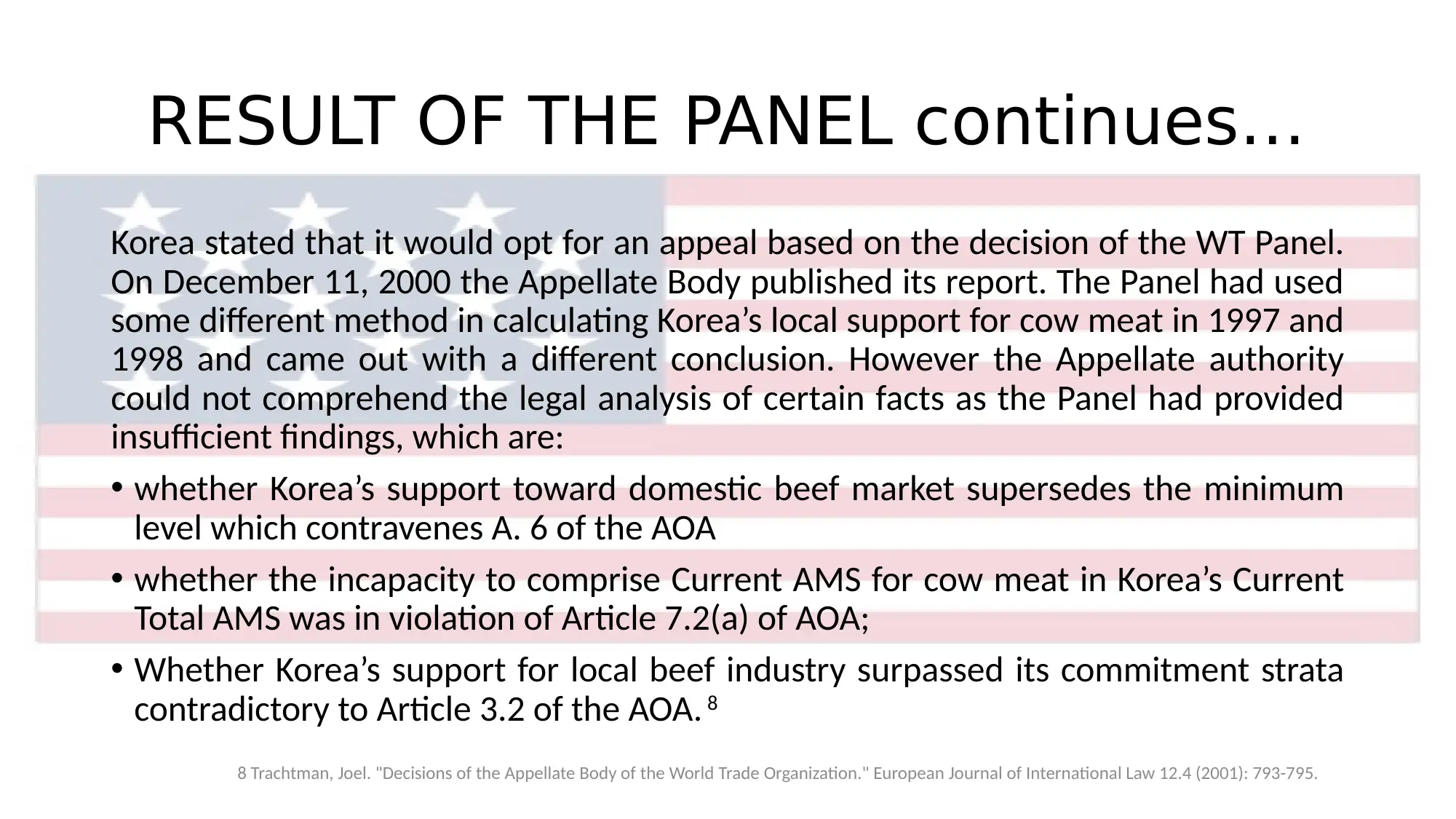
RESULT OF THE PANEL continues…
Korea stated that it would opt for an appeal based on the decision of the WT Panel.
On December 11, 2000 the Appellate Body published its report. The Panel had used
some different method in calculating Korea’s local support for cow meat in 1997 and
1998 and came out with a different conclusion. However the Appellate authority
could not comprehend the legal analysis of certain facts as the Panel had provided
insufficient findings, which are:
• whether Korea’s support toward domestic beef market supersedes the minimum
level which contravenes A. 6 of the AOA
• whether the incapacity to comprise Current AMS for cow meat in Korea’s Current
Total AMS was in violation of Article 7.2(a) of AOA;
• Whether Korea’s support for local beef industry surpassed its commitment strata
contradictory to Article 3.2 of the AOA. 8
8 Trachtman, Joel. "Decisions of the Appellate Body of the World Trade Organization." European Journal of International Law 12.4 (2001): 793-795.
Korea stated that it would opt for an appeal based on the decision of the WT Panel.
On December 11, 2000 the Appellate Body published its report. The Panel had used
some different method in calculating Korea’s local support for cow meat in 1997 and
1998 and came out with a different conclusion. However the Appellate authority
could not comprehend the legal analysis of certain facts as the Panel had provided
insufficient findings, which are:
• whether Korea’s support toward domestic beef market supersedes the minimum
level which contravenes A. 6 of the AOA
• whether the incapacity to comprise Current AMS for cow meat in Korea’s Current
Total AMS was in violation of Article 7.2(a) of AOA;
• Whether Korea’s support for local beef industry surpassed its commitment strata
contradictory to Article 3.2 of the AOA. 8
8 Trachtman, Joel. "Decisions of the Appellate Body of the World Trade Organization." European Journal of International Law 12.4 (2001): 793-795.
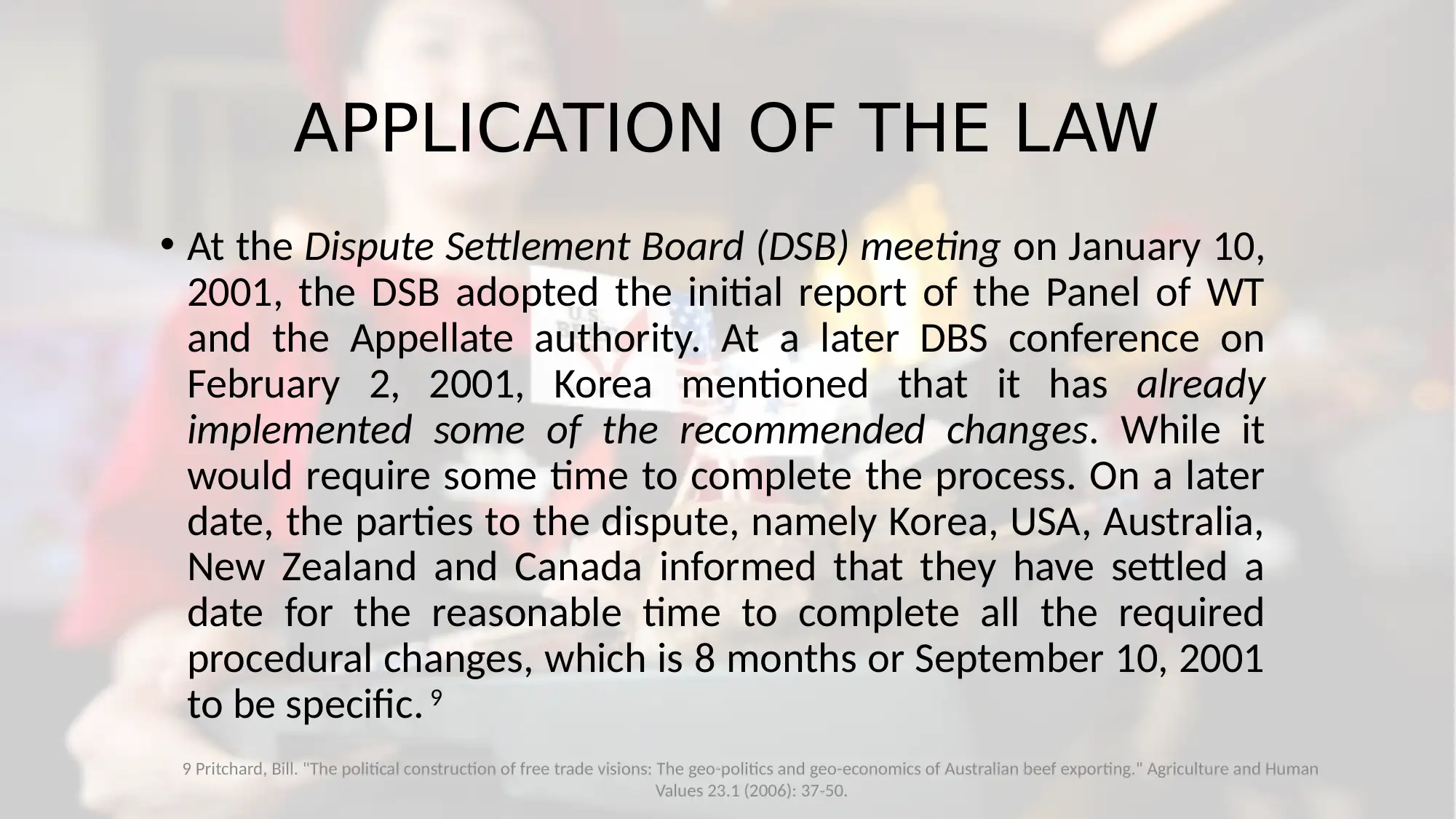
APPLICATION OF THE LAW
• At the Dispute Settlement Board (DSB) meeting on January 10,
2001, the DSB adopted the initial report of the Panel of WT
and the Appellate authority. At a later DBS conference on
February 2, 2001, Korea mentioned that it has already
implemented some of the recommended changes. While it
would require some time to complete the process. On a later
date, the parties to the dispute, namely Korea, USA, Australia,
New Zealand and Canada informed that they have settled a
date for the reasonable time to complete all the required
procedural changes, which is 8 months or September 10, 2001
to be specific. 9
9 Pritchard, Bill. "The political construction of free trade visions: The geo-politics and geo-economics of Australian beef exporting." Agriculture and Human
Values 23.1 (2006): 37-50.
• At the Dispute Settlement Board (DSB) meeting on January 10,
2001, the DSB adopted the initial report of the Panel of WT
and the Appellate authority. At a later DBS conference on
February 2, 2001, Korea mentioned that it has already
implemented some of the recommended changes. While it
would require some time to complete the process. On a later
date, the parties to the dispute, namely Korea, USA, Australia,
New Zealand and Canada informed that they have settled a
date for the reasonable time to complete all the required
procedural changes, which is 8 months or September 10, 2001
to be specific. 9
9 Pritchard, Bill. "The political construction of free trade visions: The geo-politics and geo-economics of Australian beef exporting." Agriculture and Human
Values 23.1 (2006): 37-50.
⊘ This is a preview!⊘
Do you want full access?
Subscribe today to unlock all pages.

Trusted by 1+ million students worldwide
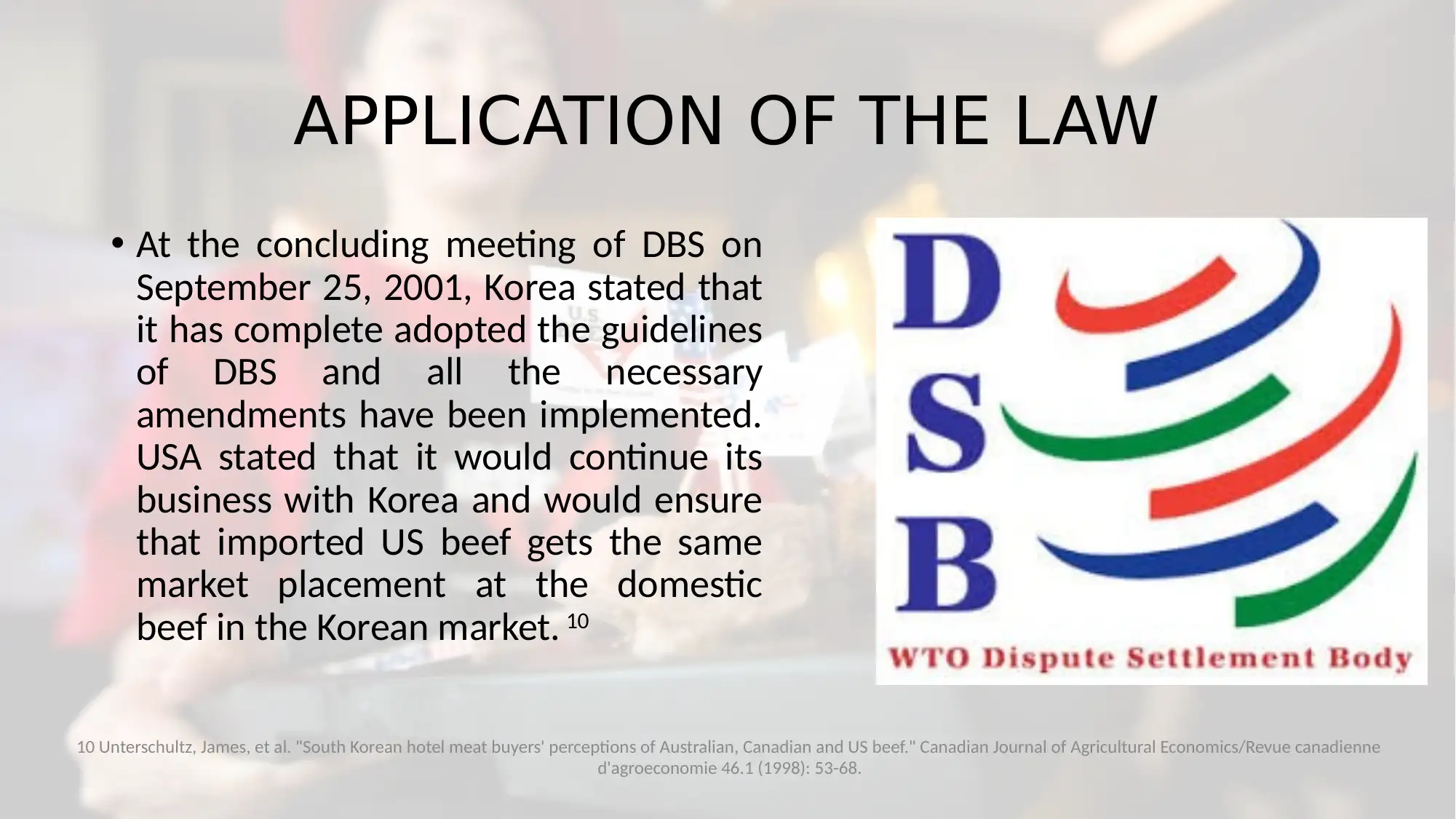
APPLICATION OF THE LAW
• At the concluding meeting of DBS on
September 25, 2001, Korea stated that
it has complete adopted the guidelines
of DBS and all the necessary
amendments have been implemented.
USA stated that it would continue its
business with Korea and would ensure
that imported US beef gets the same
market placement at the domestic
beef in the Korean market. 10
10 Unterschultz, James, et al. "South Korean hotel meat buyers' perceptions of Australian, Canadian and US beef." Canadian Journal of Agricultural Economics/Revue canadienne
d'agroeconomie 46.1 (1998): 53-68.
• At the concluding meeting of DBS on
September 25, 2001, Korea stated that
it has complete adopted the guidelines
of DBS and all the necessary
amendments have been implemented.
USA stated that it would continue its
business with Korea and would ensure
that imported US beef gets the same
market placement at the domestic
beef in the Korean market. 10
10 Unterschultz, James, et al. "South Korean hotel meat buyers' perceptions of Australian, Canadian and US beef." Canadian Journal of Agricultural Economics/Revue canadienne
d'agroeconomie 46.1 (1998): 53-68.
Paraphrase This Document
Need a fresh take? Get an instant paraphrase of this document with our AI Paraphraser
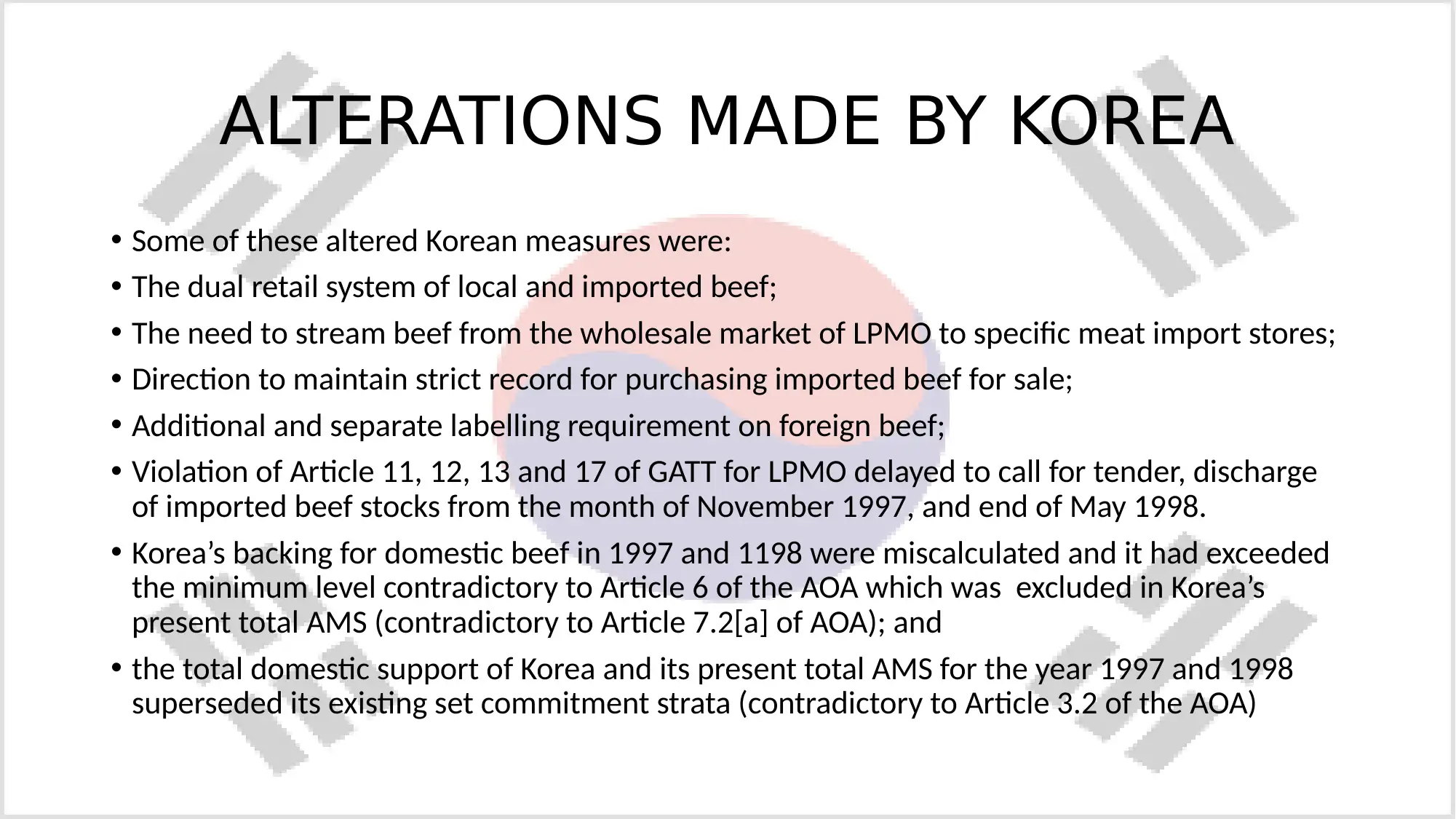
ALTERATIONS MADE BY KOREA
• Some of these altered Korean measures were:
• The dual retail system of local and imported beef;
• The need to stream beef from the wholesale market of LPMO to specific meat import stores;
• Direction to maintain strict record for purchasing imported beef for sale;
• Additional and separate labelling requirement on foreign beef;
• Violation of Article 11, 12, 13 and 17 of GATT for LPMO delayed to call for tender, discharge
of imported beef stocks from the month of November 1997, and end of May 1998.
• Korea’s backing for domestic beef in 1997 and 1198 were miscalculated and it had exceeded
the minimum level contradictory to Article 6 of the AOA which was excluded in Korea’s
present total AMS (contradictory to Article 7.2[a] of AOA); and
• the total domestic support of Korea and its present total AMS for the year 1997 and 1998
superseded its existing set commitment strata (contradictory to Article 3.2 of the AOA)
• Some of these altered Korean measures were:
• The dual retail system of local and imported beef;
• The need to stream beef from the wholesale market of LPMO to specific meat import stores;
• Direction to maintain strict record for purchasing imported beef for sale;
• Additional and separate labelling requirement on foreign beef;
• Violation of Article 11, 12, 13 and 17 of GATT for LPMO delayed to call for tender, discharge
of imported beef stocks from the month of November 1997, and end of May 1998.
• Korea’s backing for domestic beef in 1997 and 1198 were miscalculated and it had exceeded
the minimum level contradictory to Article 6 of the AOA which was excluded in Korea’s
present total AMS (contradictory to Article 7.2[a] of AOA); and
• the total domestic support of Korea and its present total AMS for the year 1997 and 1998
superseded its existing set commitment strata (contradictory to Article 3.2 of the AOA)
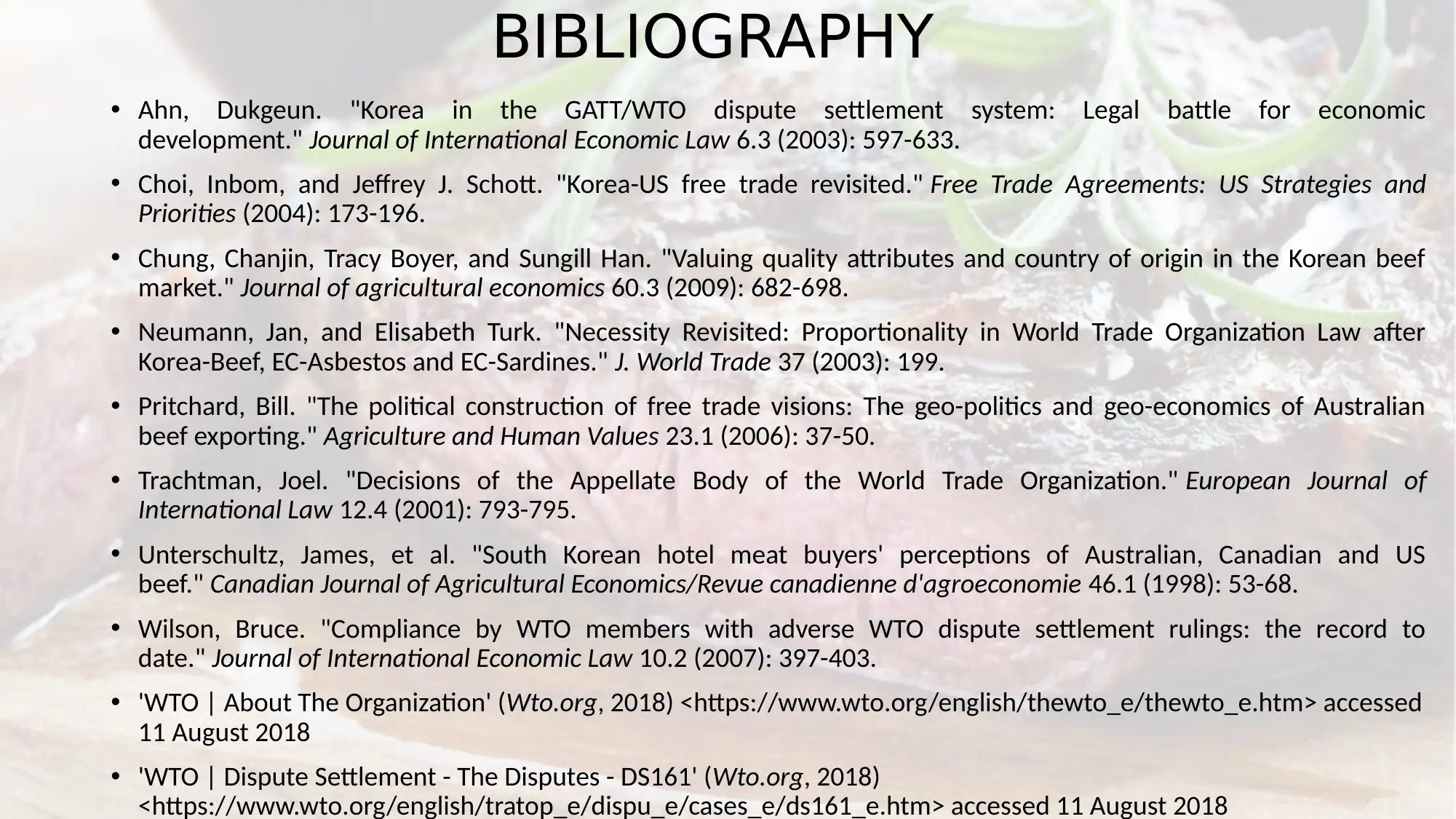
BIBLIOGRAPHY
• Ahn, Dukgeun. "Korea in the GATT/WTO dispute settlement system: Legal battle for economic
development." Journal of International Economic Law 6.3 (2003): 597-633.
• Choi, Inbom, and Jeffrey J. Schott. "Korea-US free trade revisited." Free Trade Agreements: US Strategies and
Priorities (2004): 173-196.
• Chung, Chanjin, Tracy Boyer, and Sungill Han. "Valuing quality attributes and country of origin in the Korean beef
market." Journal of agricultural economics 60.3 (2009): 682-698.
• Neumann, Jan, and Elisabeth Turk. "Necessity Revisited: Proportionality in World Trade Organization Law after
Korea-Beef, EC-Asbestos and EC-Sardines." J. World Trade 37 (2003): 199.
• Pritchard, Bill. "The political construction of free trade visions: The geo-politics and geo-economics of Australian
beef exporting." Agriculture and Human Values 23.1 (2006): 37-50.
• Trachtman, Joel. "Decisions of the Appellate Body of the World Trade Organization." European Journal of
International Law 12.4 (2001): 793-795.
• Unterschultz, James, et al. "South Korean hotel meat buyers' perceptions of Australian, Canadian and US
beef." Canadian Journal of Agricultural Economics/Revue canadienne d'agroeconomie 46.1 (1998): 53-68.
• Wilson, Bruce. "Compliance by WTO members with adverse WTO dispute settlement rulings: the record to
date." Journal of International Economic Law 10.2 (2007): 397-403.
• 'WTO | About The Organization' (Wto.org, 2018) <https://www.wto.org/english/thewto_e/thewto_e.htm> accessed
11 August 2018
• 'WTO | Dispute Settlement - The Disputes - DS161' (Wto.org, 2018)
<https://www.wto.org/english/tratop_e/dispu_e/cases_e/ds161_e.htm> accessed 11 August 2018
• Ahn, Dukgeun. "Korea in the GATT/WTO dispute settlement system: Legal battle for economic
development." Journal of International Economic Law 6.3 (2003): 597-633.
• Choi, Inbom, and Jeffrey J. Schott. "Korea-US free trade revisited." Free Trade Agreements: US Strategies and
Priorities (2004): 173-196.
• Chung, Chanjin, Tracy Boyer, and Sungill Han. "Valuing quality attributes and country of origin in the Korean beef
market." Journal of agricultural economics 60.3 (2009): 682-698.
• Neumann, Jan, and Elisabeth Turk. "Necessity Revisited: Proportionality in World Trade Organization Law after
Korea-Beef, EC-Asbestos and EC-Sardines." J. World Trade 37 (2003): 199.
• Pritchard, Bill. "The political construction of free trade visions: The geo-politics and geo-economics of Australian
beef exporting." Agriculture and Human Values 23.1 (2006): 37-50.
• Trachtman, Joel. "Decisions of the Appellate Body of the World Trade Organization." European Journal of
International Law 12.4 (2001): 793-795.
• Unterschultz, James, et al. "South Korean hotel meat buyers' perceptions of Australian, Canadian and US
beef." Canadian Journal of Agricultural Economics/Revue canadienne d'agroeconomie 46.1 (1998): 53-68.
• Wilson, Bruce. "Compliance by WTO members with adverse WTO dispute settlement rulings: the record to
date." Journal of International Economic Law 10.2 (2007): 397-403.
• 'WTO | About The Organization' (Wto.org, 2018) <https://www.wto.org/english/thewto_e/thewto_e.htm> accessed
11 August 2018
• 'WTO | Dispute Settlement - The Disputes - DS161' (Wto.org, 2018)
<https://www.wto.org/english/tratop_e/dispu_e/cases_e/ds161_e.htm> accessed 11 August 2018
⊘ This is a preview!⊘
Do you want full access?
Subscribe today to unlock all pages.

Trusted by 1+ million students worldwide
1 out of 13
Related Documents
Your All-in-One AI-Powered Toolkit for Academic Success.
+13062052269
info@desklib.com
Available 24*7 on WhatsApp / Email
![[object Object]](/_next/static/media/star-bottom.7253800d.svg)
Unlock your academic potential
Copyright © 2020–2025 A2Z Services. All Rights Reserved. Developed and managed by ZUCOL.





